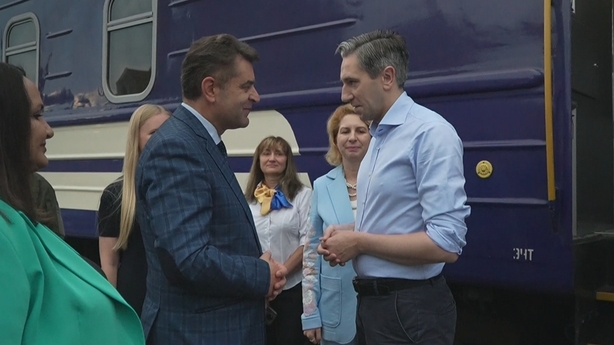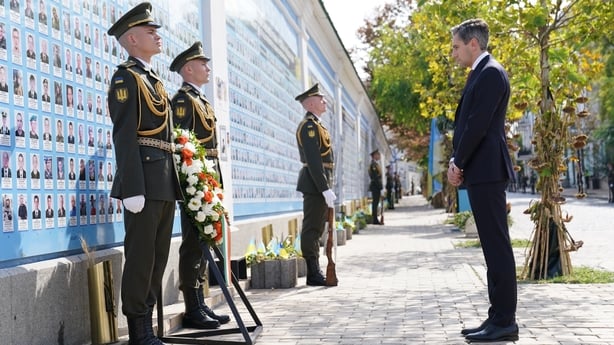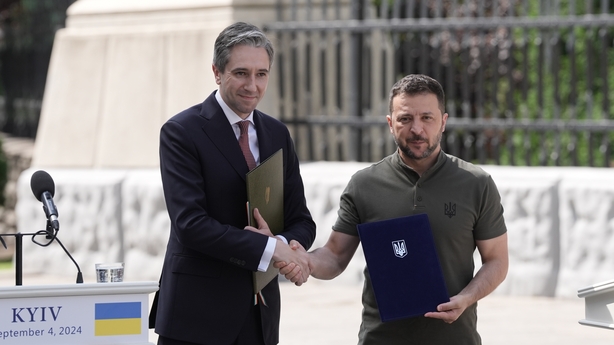In the early hours of Wednesday morning, only a few hours after Taoiseach Simon Harris had travelled through Lviv, a block of residential flats in the city was hit by a Russia missile.
Seven people were killed, including a mother and her three children.
The Taoiseach called it "a vicious terrorist attack by the Russian regime".
A day previously, Russia hit a military academy in the central Ukrainian city of Poltava with two ballistic missiles, killing 53 people, including many military cadets.
Stunned by Ukraine's incursion into Kursk, Russia's response has been to intensify its aerial attacks on cities and the country's energy infrastructure.
Only last week, Russian forces launched two consecutive days of mass aerial attacks across more than half of Ukraine's regions.
Western Ukrainian cities, considered safer than most parts of the country until recently, are now being targeted more frequently by Russia.
For Mr Harris, his 24 hours in Ukraine provided him with first-hand insight of what Ukrainians have been enduring for two-and-a-half years.
An air raid alert had sounded for hours that morning across Kyiv Oblast and ended just before our train pulled in at Nemishaieve station, about a one-hour drive north of the capital. Overnight, Russia had targeted more than 40 locations across the country.

Destroyed, empty flats in Borodyanka, a town occupied and shelled by Russian forces during the initial weeks of the war, offered a bleak sight of how Russia has targeted civilian infrastructure in this war. In the east of Ukraine, many Russian-occupied or frontline towns now lie in ruins.
In Kyiv, everyday life appears to continue as normal. People go about their business in the city centre and roads are busy with cars.
But Ukraine is a country at war.
The Wall of Remembrance outside St Michael's cathedral, where Mr Harris laid a wreath on behalf of Ireland, features photographs of thousands of fallen Ukrainian soldiers.
Standing there, looking at all the faces of those young soldiers, the impression is immediate. Ukraine has paid, and continues to pay, a high price during 10 years of conflict with Russia to guard its sovereignty.

"You need to see it with your own eyes to begin to fathom what is going on here," said Mr Harris, summing up his trip at the Trypilska thermal power plant.
Trypilska was the largest power plant in Kyiv Oblast, but has not been operational since April when a Russian missile struck the roof and sent fire to its main turbine. Debris sits around the plant and a large portion of the roof is missing.
Russia’s targeting of Trypilska has placed greater strain on energy supply in the wider Kyiv region with authorities redirecting power to the capital from other plants farther away.
Ireland's new €36m aid package for Ukraine, announced by the Taoiseach in Kyiv, will fund among others, reconstruction projects for internally displaced people and programmes for victims of gender-based violence, as well as a joint project with Lithuania to build bomb shelters in schools.
It brings the value of Ireland's total humanitarian aid for Ukraine to €380m since the start of Russia's full-scale invasion in 2022.
That kind of support was welcomed on Wednesday in Kyiv by Ukraine's president and other Ukrainian officials.
"We, in Ukraine, especially appreciate every show of support for our state and our people, and we value the fact that Ireland, a militarily neutral state, is not neutral morally," said Voldomyr Zelensky during his press conference with Mr Harris.
The 10-year agreement on cooperation and support between Ireland and Ukraine, signed by the two leaders on Wednesday, formalises closer bilateral ties between the two countries and commits to paper, Ireland's strong support for Ukraine's right to defend its sovereignty.

The agreement also underlines Ireland's support for Ukraine's membership of the EU.
That kind of political support is valued in Kyiv and explains why an Irish leader - the third Taoiseach to visit Kyiv since the war began - was again welcomed warmly by Mr Zelensky and Prime Minister Denys Shmyhal on a day when the Ukrainian government was going through its biggest cabinet reshuffle since the start of the war.
Four Ukrainian ministers tendered their resignation on Wednesday, including foreign minister Dmytro Kuleba who has led Ukraine's diplomacy efforts across the world since the invasion began, pushing for greater sanctions against Russia.
During his press conference with the Taoiseach, Mr Zelensky said his government needed "new energy".
New justice and infrastructure ministers were also approved by the Ukrainian parliament.
Changes in the cabinet had been expected for a number of months, but Mr Kuleba's departure will be a loss to Ukraine's diplomatic efforts.
On the battlefield, Russia has not made a concerted effort yet to push back Ukrainian gains in the Kursk region.
Mykhailo Samus, a senior Ukrainian defence analyst, told RTÉ News that recapturing territory in Kursk held by Ukrainian forces will be difficult for Russia.
He pointed out that Ukraine's offensive operation, which began on 6 August, advanced along the Seym and Sudzha rivers in Kursk, using them as the left and right flank of the operation to provide Ukrainian forces with natural lines of defence.
"Ukrainian forces are successfully trying to build the the line of defence exactly along the river," said Mr Samus.
He believed it could take a force of at least three divisions - about 50,000 Russian troops - to mount a counterattack against Ukrainian lines in Kursk.
Russian forces do not appear to have the capability to mount another big military operation while still trying to capture the city of Pokrovsk in Donbas.
"If Russia, gives us a couple months, Ukrainian forces could build the fortifications. So we don't need a lot of forces to keep this territory in Kursk," said Mr Samus.
The war is being fought on two key fronts: militarily and politically. Mr Zelensky and the rest of Ukraine's leadership know the value of political support just as much as the military aspect.
Holding territory in Kursk would give Ukraine more leverage at the negotiating table, if and when that happens.
But this week has also shown that Kyiv prioritises relations with friendly neutral countries that have political clout in EU circles.







